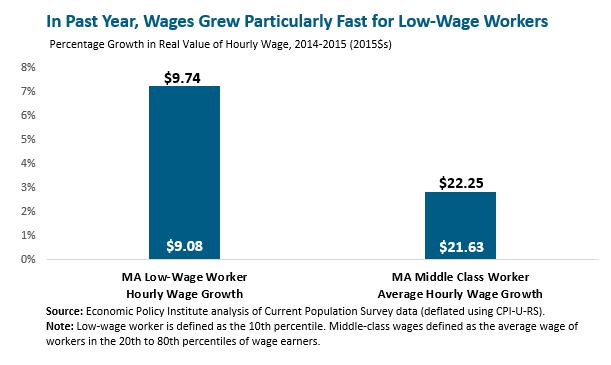By Audrey Cooney, news staff
Massachusetts lowest-paid workers saw their average wages rise seven percent over the past year, according to a recently released report by Boston-based nonprofit Massachusetts Budget and Policy Center.
The annual report, called the “State of Working Massachusetts,” showed that while wages rose slightly over the past year, the change follows decades of stagnant wages. Meanwhile, poverty levels both in the state and across the United States remained high despite the modest economic growth. In 2013, MassBudget reported, the U.S. had a 15.8 percent poverty rate, while Massachusetts was at 11.9 percent.
“The minimum wage increase did push up wages a little bit for people in Massachusetts, but you still have to wonder why haven’t wages risen more,” said Gerald Friedman, a professor of economics at University of Massachusetts-Amherst.
According to Friedman, the U.S. economy’s private sector has seen mild improvement while the public sector continues to suffer. In the period following the financial crisis of 2007, public workers like teachers, firefighters and police officers have been laid off in large numbers without being rehired as the economy turned upward, he said.
Mid-wage industries accounted for 37 percent of recession losses between January 2008 and February 2010, according to a 2014 National Employment Law Protect data brief. The same sector accounted for 26 percent of recovery growth measures from February 2010 to February 2014.
Friedman said young people are increasingly being forced to participate in the gig economy or work as unpaid or poorly paid interns. A lack of jobs in the U.S., Friedman said, is part of what is keeping wages low.
“Right now there’s not a lot of work, so people are taking jobs at whatever wage they can get,” he said.
Anita Mohandas, a Northeastern graduate student studying information systems, works at the Husky Card Center on campus. She said she thinks her hourly wage of $11 is “quite decent,” and that her friends who also work on campus are satisfied with their wages.
Atindra Mardikar, a sophomore computer science major, also said he’s satisfied with his wage of $11 an hour. Mardikar works at the information desk in Curry Student Center and said his job mostly consists of giving directions to lost students.
“I think that’s a fair wage, because all we do is sit and wait for people to walk up to the desk,” he said.
However, Mardikar said he believes that minimum wage workers in on-campus vendors like Dunkin’ Donuts should be paid more.
“Even $12 or $13 would be an improvement,” he said. “They actually do the physical work, you know?”
Massachusetts’ minimum wage, which is $10 an hour and is scheduled to rise to $11 an hour next January, is significantly higher than the federal minimum wage of $7.25 an hour. According to the report, the state’s wages have routinely been higher than national average for workers in every wage bracket. MassBudget President Noah Berger said the disparity stems from several different factors.
“We see in the report that policy matters,” he said. “For example, we saw the first time in awhile significant growth for low-wage workers. And that’s largely because the state raised the minimum wage. We also see that Massachusetts has the best-educated workforce in the country and the highest median wage in the country. And that’s not a coincidence: states that have better-educated workers have higher wages and stronger economies.”
Wages in the U.S. were tied to productivity levels until the 1970s, according to the report. But starting in 1973, growth in productivity began to outpace growth in wages. As of 2013, the report stated, U.S. productivity has grown by 151 percent, while wages have only grown 19 percent.
Berger says there are several policy changes that the state can make that would boost state economy and tangibly better the lives of working people. These include prioritizing spending on education, raising the minimum wage and ensuring employees have access to sick time and paid family medical leave, he said.
“I think the hope is to focus our public debate and, ultimately, public policy strategies for raising the rates of income for working people,” said Berger. “I think, long-term, the policy challenge is to identify strategies that can actually improve the economic lives of people in the state.”
Infographic courtesy Massachusetts Budget and Policy Center, Creative Commons








![A demonstrator hoists a sign above their head that reads, "We [heart] our international students." Among the posters were some listing international scientists, while other protesters held American flags.](https://huntnewsnu.com/wp-content/uploads/2025/06/image12-1200x800.jpg)
